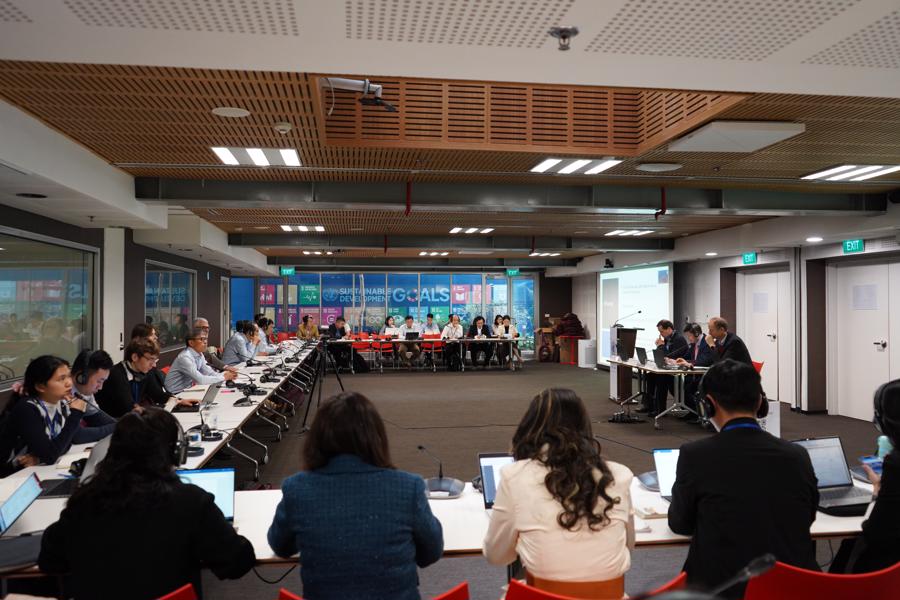[ad_1]
On February 24, the United Nations Development Program (UNDP), the European Union and the Forestry Directorate of the Department of Agriculture and Rural Development jointly organized a technical workshop on agricultural production and trade.
The workshop gave delegates the opportunity to hear different opinions from speakers with valuable knowledge and experience related to the production and trade of agricultural products without deforestation.
According to Mr. Patrick Haverman, Deputy Representative of the United Nations Development Program (UNDP) in Vietnam, deforestation and forest degradation are major causes of climate change and biodiversity loss worldwide.
Commodities expected to be affected by this regulation include: palm oil, soybeans, timber, livestock, cocoa, coffee, rubber and certain related products (e.g. chocolate, furniture, tires, printed matter).
Reducing the risk of products being imported into or exported from the EU in the supply chain related to deforestation/forest degradation. At the same time, reduce the risk of products in the supply chain being imported into or exported from the EU related to deforestation/forest degradation. In November 2022, the European Commission (EC) proposed to develop a supply chain regulation that does not cause deforestation and forest degradation. By December 2022, the provisional political agreement between the European Parliament and the Council had been approved.
If implemented, this regulation will have a significant impact on companies and countries that export agricultural products to the EU market. “Given the recent international regulations and context on sustainable production and trade and deforestation-free supply chains, UNDP stands ready to work with government and private sector partners to create an enabling environment for the supply chain of agricultural products that do not cause deforestation and trade and Support production models that do not cause deforestation,” emphasizes Patrick Haverman.

Giving an overview of the new EU regulation on non-deforestation products, Mr. Jesus Lavina, Deputy Head of Development Cooperation at the European Union Delegation to Vietnam, said that supply chain regulations for deforestation and forest degradation are not expected to come into force this June and expected to start applying obligations for operators from December 2024 (for small companies from June 2025).
When this regulation comes into force, only legal and non-deforested products may be imported into or exported from the EU. Important obligations apply to operators and traders who are not SMEs.
Traceability between the goods and the country where they are manufactured is also strictly enforced. Products must be legal under the laws of the country of manufacture, including applicable human rights, labor rights and informed, free and satisfactory consent.
Commodities likely to be affected by this regulation include: palm oil, soybeans, timber, livestock, cocoa, coffee, rubber and certain derived products (e.g. chocolate, furniture, tires, printed matter). The regulation applies to both domestically manufactured and imported goods and products made from them. Initial coverage of select items and derivatives; The list is updated regularly.
Mr. Jesus Lavina reiterated that the regulation will impact suppliers both inside and outside the EU. Therefore, all stakeholders must be ready for adoption by the end of 2024, and whoever adapts fastest will have a competitive advantage. The EU stands ready to work closely together and to support partner countries’ efforts to accelerate the transition to agricultural production, sustainable forest management and the development of transparent and sustainable supply chains.
Mr. Tran Quang Bao, deputy director-general of the Ministry of Forestry, said Vietnam’s agricultural exports will be affected by this law in the coming period, where coffee is a commodity that accounts for a large part of Vietnam’s exports of agricultural, forestry and fishing industry for the European market.
The Central Highlands, which is an important agricultural production area in the development strategy of Vietnam’s agricultural sector, is not only known as the capital of coffee, but also strongly develops other agricultural products such as coffee, rubber, pepper and fruit trees in recent years.
“By exchanging EU regulations as well as international companies and friends’ experiences on the development of the aviation industry that causes deforestation, the conference aims to be an opportunity for us to exchange, discuss and learn from international partners’ experiences to create a roadmap for the development of Vietnam’s agricultural products to meet EU regulations in the coming period,” said Mr. Bao.
The workshop takes place as part of the European Union-funded project “Sustainable and comprehensive landscape management through an approach to sustainable development without deforestation in Lam Dong and Dak Nong”.
Legislative and implementation roadmap:
November 2021: European Commission proposes
June 2022: Council of Europe general approach
September 2022: European Parliament resolution
December 2022: provisional political agreement between the European Parliament and the Council
May-June 2023 (tentative): Valid
December 2024 (expected): start of application of obligations for operators (from June 2025 for small companies)
[ad_2]
Source link

